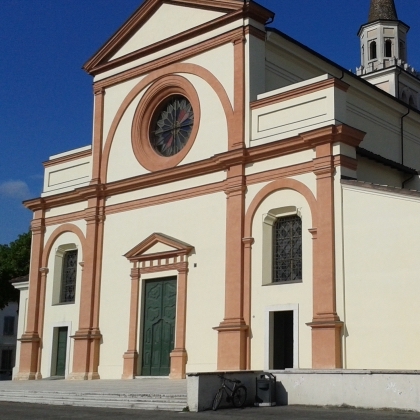Holy Week is about to begin, and like every year, wherever I find myself, my thoughts wander to my parish church, San Pietro in Bozzolo, where for decades — and up until a few years prior to my birth — Father Primo Mazzolari’s tormented, passionate and prophetic voice echoed. A voice that, thanks to the intuition of the Zangrossi brothers and of the absolutely trustworthy Doge, dozens of homilies were taped and we are still able to listen to them today, enjoying not only the depth of Fr. Mazzolari’s thoughts and the clarity of his gospel readings, but also the unmistakable pronunciation and intonation, of a voice that seems to come straight from the heart, without passing through vocal cords.

Exactly 60 years ago, on Holy Thursday 1958, the year prior to his death, Fr. Primo delivered what would become his most famous sermon: some called it “Our Brother, Judas”, others, “But I Also Love Judas”. Perhaps the most beautiful and most shocking homily of the 20th century that continues to move believers and non-believers, even after so much time has passed. A text that does not need explanations or footnotes; and exactly for this reason writing this piece is taking its toll on me. I just want to recommend that you simply read it, or better yet, listen to it on your own (you can easily find it on the Internet ) and let it resonate in your mind and heart. I will limit myself to contextualize Father Mazzolari’s homily in its time, and attempt to understand together with you why it remains more timely than ever.

The Church, in its two thousand years of wisdom, proclaimed thousands of saints and blessed, but it never said officially and with certainty that any human is damned, not even Judas! Our Dante took good care instead of populating Hell and, as we well know, reserved to Judas (together with Brutus and Cassius) the worst torture — to be mangled for all eternity in one of Satan’s three mouths. And many preachers over the centuries have expressed their contempt and hatred for Judas, some actually pushing themselves to say that they would have willingly strangled him with their bare hands.
Father Primo starts with a close reading of the Gospel text, and in particular, with the word “friend” with which Jesus addresses Judas in the very moment in which he betrays him, and in light of this word re-reads the earthly and celestial destiny of the apostle. “Poor Judas. What went through his soul, I don’t know. (…) I won’t even attempt to explain it to you; I am satisfied to ask you to have a bit of pity for our poor brother, Judas.” And in front of the misterious and unsettling “explanation” of the Gospel “Satan took him over”, Father Primo comments with a more concrete and earthly reference on the power of corruption that money has. “Thirty dinar! A small profit. A conscience is worth little, oh my dear brothers — thirty dinar. And sometimes we sell ourselves for less than 30 dinar”. And the next day, Good Friday, the archpriest wanted in his church, next to the cross displayed to the veneration of the faithful, the hanging tree — the gallow of the disciple whose greatest sin was not betrayal, but desperation.
Father Primo’s conclusion is precisely the opening up to the hope in God’s infinite mercy: “I also love Judas, Judas is my brother. I will also pray for him this evening, because I do not judge, I do not condemn; I should judge myself, I should condemn myself. I can’t not think that even for Judas, God’s mercy, this embrace of compassion, that friendly word, that the Lord spoke to him while he was kissing him to betray him, I can’t not think that this word did not travel into his poor heart. And perhaps at the last moment, remembering that word and the acceptance of that kiss, even Judas must have felt that the Lord still loved him and would receive him among his own over on the other side.”

Re-reading these words we understand well how Pope Francis was touched by this country priest, who for decades had been humiliated and mistreated by his own Church. One could say — without exaggerating — that in the homily of the Archpriest of Bozzolo of 60 years ago, there is in essence the manifesto of Bergoglio’s pontificate. A pontificate criticized and ostracized by many Catholics today, including cardinals, bishops, priests and lay-people that would like to impose their own limits on God’s mercy; that to the Father’s hug of forgiveness prefer the articles of the Code of Canon Law; Catholics that put together committees and donate funds to change the translation of the Roman Missal so that during the consecration, the priest will state that the Blood of Christ was shed “for many” and not “for all”. Yes, because to them, remaining in heaven with Judas is not an option, and they conceive of eternal joy only if there is someone condemned to eternal suffering.
For these conformists and for the conformist that hides in each one of us, the message of forgiveness, mercy, and brotherhood that Father Mazzolari launched from Bozzolo 60 years ago is more current than ever.
Translated by Emmelina De Feo












